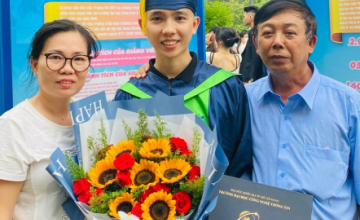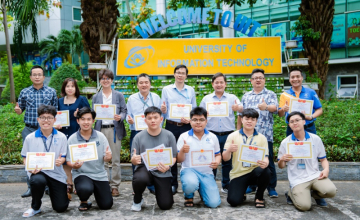Chúc mừng nhóm sinh viên Lê Trần Gia Bảo, Trần Thanh Phong, Phạm Thái Bảo sinh viên ngành Khoa học máy tính và An toàn thông tin cùng nhóm nghiên cứu InsecLab đã có bài báo nghiên cứu về Phương pháp phát hiện mã độc trên Windows được chấp nhận đăng tại Hội nghị khoa học quốc tế The 13th International Symposium on Information and Communication Technology (SOICT 2024).
Thông tin về bài báo khoa học
Tên bài báo: “An Approach of Fine-Tuning Language Models and Handling Long Sequences for Efficiently API Call Analysis in Uncovering Windows Malware”
Sinh viên thực hiện:
+ Lê Trần Gia Bảo – Khoa học máy tính (Chính quy 2022)
+ Trần Thanh Phong – An toàn thông tin (Chính quy 2022)
+ Phạm Thái Bảo – An toàn thông tin (Chất lượng cao 2021)
GVHD: ThS. Phan Thế Duy, ThS. Đỗ Thị Thu Hiền, TS. Phạm Văn Hậu
Chủ đề nghiên cứu: Trí tuệ nhân tạo và An toàn thông tin
Bài báo khoa học là kết quả đề tài nghiên cứu được các bạn sinh viên thực hiện với nhóm nghiên cứu InSecLab trong thời gian bạn tham gia nghiên cứu khoa học về Phương pháp phát hiện mã độc trên Windows dựa trên các kỹ thuật học sâu tại Phòng thí nghiệm An toàn thông tin (InSecLab).
Tóm tắt bài báo:
“Application Programming Interfaces (APIs) continue to be the primary and most accessible data source for malware detection and classification methods. With recent Deep Learning (DL) breakthroughs, techniques for analysing API call sequences have become increasingly effective at extracting valuable insights. However, the length and complexity of these sequences can pose challenges, making them difficult to interpret and analyse comprehensively. Furthermore, traditional DL models may struggle to capture long-range dependencies and sequential patterns in such extended API call sequences, which are essential for accurate malware detection. This paper proposes a novel malware detection approach based on API call sequences that leverages the power of the Bidirectional Encoder Representations from Transformers (BERT) and a DL model combining Convolutional Neural Network (CNN) and Extended Long Short-Term Memory (xLSTM) techniques. Specifically, BERT effectively captures the contextual relationships between API calls, while CNN-xLSTM proves highly effective at classifying sequences by preserving long-term dependencies and handling the complexities of sequential data. Experimental results on the EMBER dataset show that our approach performs better than existing state-of-the-art embedding and detection methods in both accuracy and robustness.”
Thông tin chung:
Hội nghị SOICT 2024 là một hội nghị khoa học quốc tế bao gồm các lĩnh vực nghiên cứu quan trọng bao gồm Nền tảng AI và Dữ liệu lớn, Công nghệ mạng và truyền thông, Xử lý đa phương tiện, Kỹ thuật phần mềm, Ứng dụng AI, AI tạo sinh, Nghiên cứu và tối ưu hóa hoạt động ứng dụng, An toàn thông tin.
Hội nghị SOICT 2024 sẽ diễn ra tại Thành phố Đà Nẵng do Trường Công nghệ Thông tin và Truyền thông – ĐH Bách Khoa Hà Nội, Trường ĐH Khoa học Tự nhiên - ĐHQG TP. HCM, Trường ĐH Bách Khoa, ĐH Đà Nẵng phối hợp tổ chức vào ngày 13 - 15/12/2024.
Link hội nghị: https://soict.org/submission/paper-submission/
Mọi thông tin chi tiết xem tại: https://www.facebook.com/share/p/8bHrfazkHfmYAqPj/
Đông Xanh - Cộng tác viên truyền thông Trường Đại học Công nghệ Thông tin








